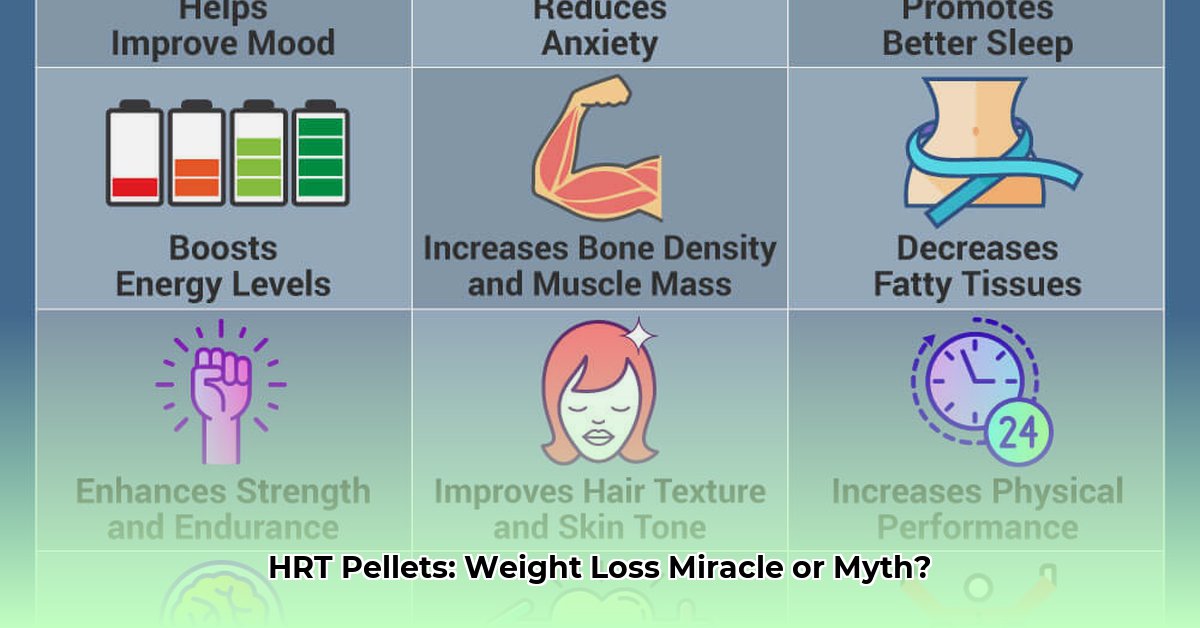
HRT and Weight Change During Menopause
Menopause, a significant life transition for women, often brings unwelcome weight gain, particularly around the abdomen. This change is frequently linked to the natural decline in estrogen and testosterone levels. Hormone replacement therapy (HRT) is often considered to alleviate menopausal symptoms, and some women hope it might also aid in weight management. But does HRT, particularly via pellets, offer a solution to weight concerns? The answer, as we'll explore, is complex. Does it address the hormonal imbalances contributing to weight gain? Understanding the multifaceted relationship between HRT, weight, and menopause is key.
HRT Pellets: A Convenient Delivery Method?
HRT pellets offer a unique delivery system. These small, slow-release implants are inserted under the skin, providing a consistent hormone supply, eliminating the daily routine of creams, patches, or pills. This convenience is a significant advantage for many women. However, adjusting the hormone dosage is less straightforward than other HRT methods, as once implanted, alterations necessitate another procedure. This inflexibility is a crucial consideration when determining suitability. Does this limited adjustability outweigh the benefits of consistent hormone release for you?
Comparing HRT Delivery Methods
Several methods deliver HRT, each with advantages and drawbacks. The best approach depends greatly on individual needs and preferences, so understanding the differences is vital. Here's a comparison:
| Delivery Method | Advantages | Disadvantages |
|---|---|---|
| Pellets | Convenient, consistent hormone release | Inflexible dosage, requires minor surgical procedure, potential implant site reactions |
| Gels/Creams | Flexible dosing, easy application | Requires daily application, potential skin irritation |
| Patches | Convenient, relatively easy application | Hormone release may be less consistent than other methods |
| Injections | Precise dosage, rapid absorption | Requires medical intervention, potential injection site reactions |
Bioidentical Hormones: Fact vs. Fiction
Many women opt for bioidentical hormones, believing their similarity to naturally produced hormones equates to greater safety and efficacy. While this is a popular belief, the scientific evidence supporting superior outcomes compared to synthetic hormones, particularly regarding weight management, is currently limited. "More research is needed to definitively assess the benefits of bioidentical hormones," states Dr. Emily Carter, Endocrinologist at the University of California, San Francisco.
What the Research Reveals
Studies examining the relationship between HRT and weight loss have yielded inconsistent results. Some show a link to improved weight management, while others found no significant effect. This variability highlights the personalized nature of HRT's impact on weight. "The response to HRT varies greatly between individuals," notes Dr. Sarah Miller, a menopause specialist at the Mayo Clinic. It's crucial to understand HRT is not a guaranteed weight-loss solution.
Potential Risks: An Informed Decision
As with any medical intervention, HRT carries potential risks, including an increased risk of blood clots, stroke, and certain cancers. A thorough discussion with your doctor is essential to weigh these risks against the potential benefits before starting any HRT regimen. "Open and honest communication with your physician is paramount," advises Dr. David Lee, Gynecologist at Stanford University Medical Center.
A Personalized Approach: Your Unique Journey
Finding the right HRT approach—hormone type, delivery method, and dosage—requires a personalized strategy. Your doctor will collaborate with you, considering your overall health, medical history, and unique hormone levels. There is no one-size-fits-all solution. Will your individual needs be best met with pellets, or would another HRT approach be more suitable for you?
Realistic Expectations: A Holistic Strategy
It's crucial to manage expectations. HRT pellets, or any HRT method, don't guarantee weight loss. While it may help manage menopause-related weight gain indirectly by improving energy levels and reducing debilitating symptoms, a healthy lifestyle including regular exercise and a balanced diet remains essential for effective weight management. The synergistic approach of HRT and a healthy lifestyle will likely yield the best result for most women.